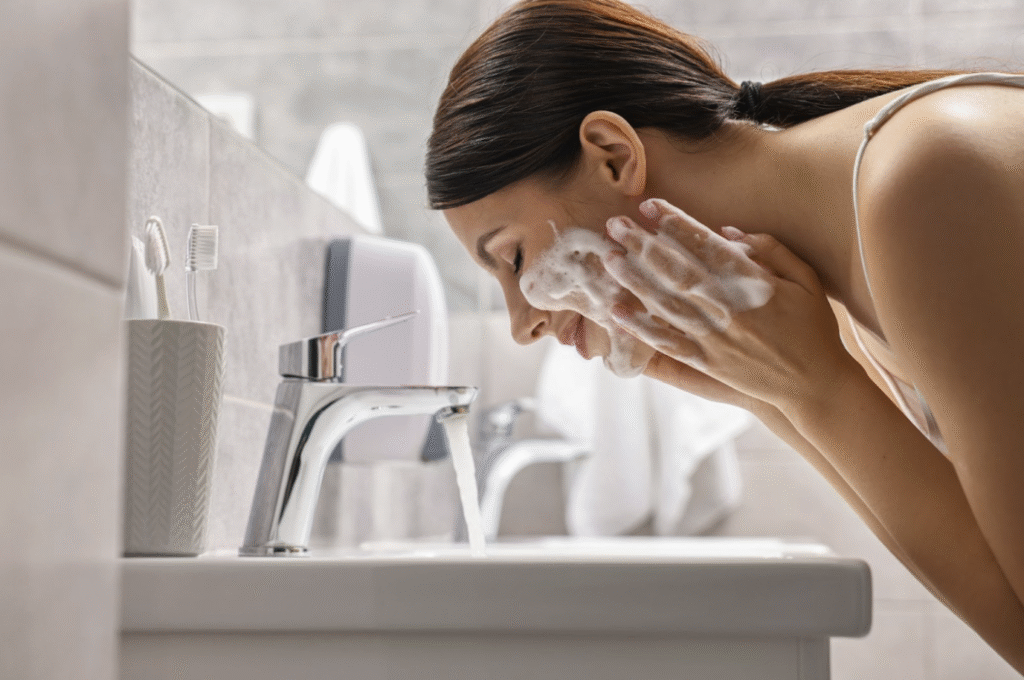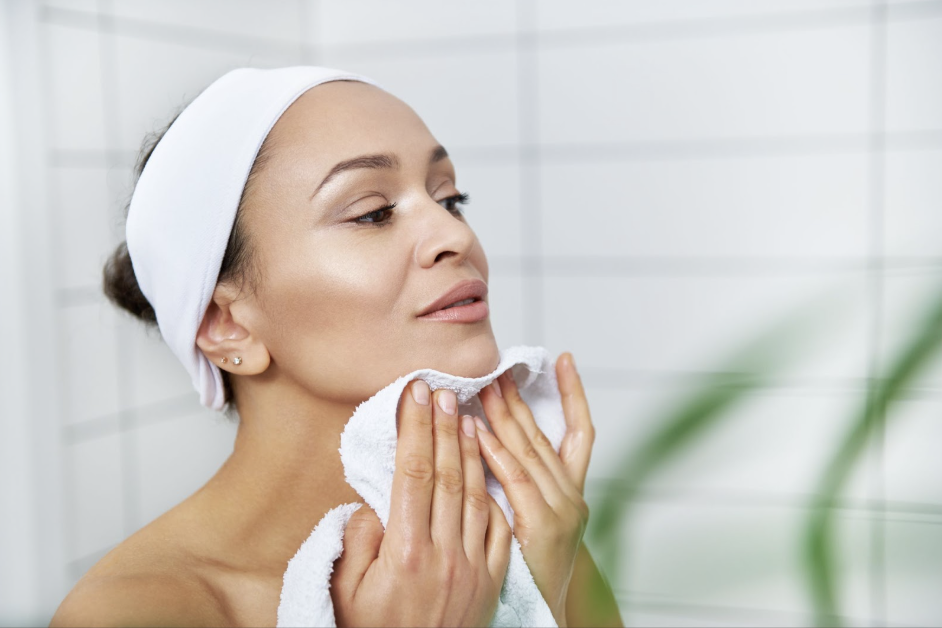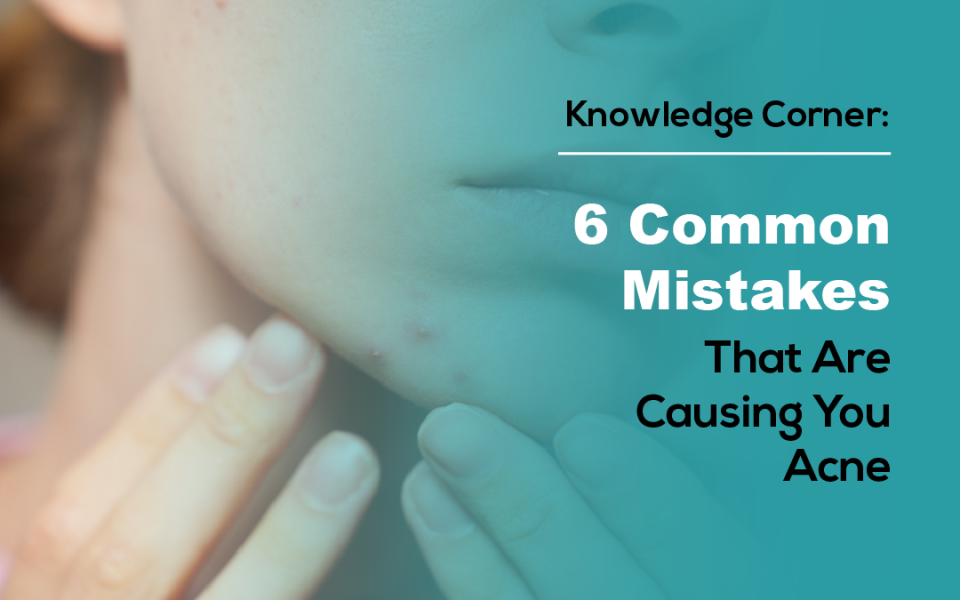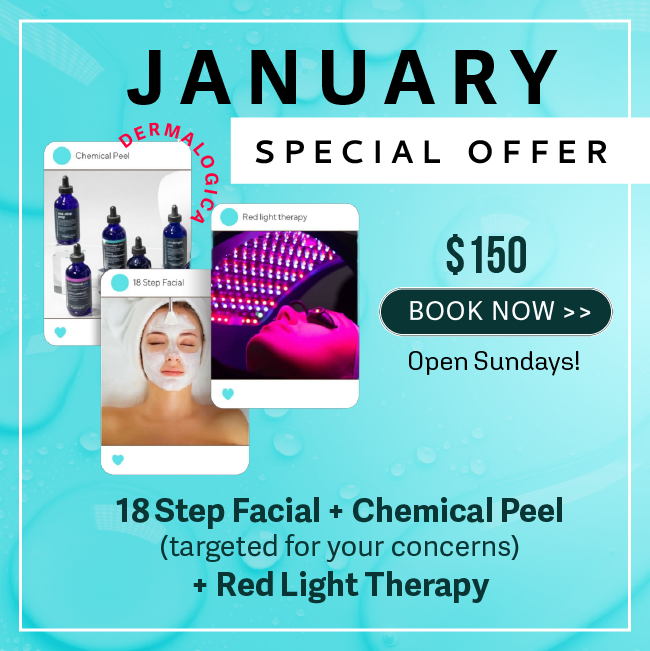If you’ve tried everything to clear your skin but still wake up to new breakouts, you’re not alone. Acne is complicated– and sometimes it’s the little habits in your routine that quietly make things worse.
For years, acne has had some confusion surrounding it. It’s often tied to myths and misinformation that it means your skin is dirty or you’re not taking care of yourself. That couldn’t be further from the truth. In reality, most acne stems from underlying issues that many people don’t even realize are contributing factors.
Let’s go through six common mistakes people make without realizing it — and what you can do instead to help your skin calm down and clear up.
And remember– it’s common to make these errors because there’s a lot of misinformation floating around and some folks have just never been taught the right way to do things. But we have some great news: these are totally things that you can fix with just a few small changes.

1. Over-Exfoliating (Yes, You Can Have Too Much of a Good Thing)
Exfoliation can do wonders for your complexion– but too much of a good thing can backfire, and cause the opposite effect. Over-exfoliating actually strips away the skin’s natural barrier, causing irritation and inflammation.
According to the American Academy of Dermatology’s guide on habits that make acne worse, aggressive exfoliation can trigger redness, sensitivity, and more frequent breakouts.
Signs of over-exfoliation include:
- Redness and sensitivity
- Flakiness or tightness
- Increased breakouts or burning sensations
For most skin types, exfoliating two to three times a week is ideal– not daily. In fact, exfoliating more often than recommended can disrupt your moisture barrier and actually invite breakouts.
If your skin feels raw or looks shiny after exfoliating, it’s time to scale back.
(Also note: At Glowing Results Skin Spa, our professionals offer customized facials that safely remove buildup without damaging your skin barrier.)
Safe Ways to Exfoliate:
If your current routine feels too harsh, here’s how to rebalance:
- Swap gritty scrubs for gentle exfoliants with lactic acid or fruit enzymes.
- Always follow exfoliation with a hydrating serum or moisturizer.
- Look for ingredients like ceramides and hyaluronic acid to restore moisture.
The key to exfoliation is balance. Healthy exfoliation should refresh, not irritate.
2. Popping Pimples (We Know, It’s Tempting)
We know it’s tempting, but popping pimples often does more harm than good. Sure that glaring white head probably feels like the only thing anyone can see on your face, but fight the temptation. Squeezing blemishes can spread bacteria, increase scarring risk, and delay your skin’s natural healing process.
The American Academy of Dermatology warns that pimple popping can cause deeper infections, worsen inflammation, and make blemishes larger and more painful. They also emphasize that proper acne treatments should focus on consistency and gentle care– not force. Instead of popping, why not try the following.
Some Effective Alternatives to Pimple Popping:
- Using non-comedogenic (non-pore clogging) products and gentle cleansers
- Applying hydrocolloid patches to absorb fluid and reduce redness
- Spot treatments with ingredients like salicylic acid or benzoyl peroxide
- Visiting a licensed esthetician or dermatologist for professional extractions
Consistency and patience are the real keys to clearing your skin, no popping required.
3. Falling Asleep in Makeup
After a long day, skipping your makeup removal might feel harmless, but it’s one of the biggest skincare mistakes you can make. Sleeping in makeup clogs your pores, traps oil and bacteria, and can dull your skin’s natural radiance.
It also accelerates inflammation, which worsens acne over time. A strong nighttime routine is non-negotiable for healthy skin. So even when you’re exhausted– taking ten minutes to remove make up properly is totally worth it.

Quick Nighttime Cleansing Tips:
- Double cleanse. Start with an oil-based remover to dissolve makeup, then follow with a gentle water-based cleanser.
- Use non-stripping products. Avoid harsh wipes and alcohol-heavy removers.
- Always rinse thoroughly. Leaving behind residue can still clog pores overnight.
A few extra minutes each night can make a major difference in how your skin looks and feels.
4. Touching Your Face All the Time
Most people touch their faces a lot more than they think. So what’s the big deal? Well, your hands come into contact with countless surfaces throughout the day, collecting oil and bacteria that transfer easily to your face.
Some people fidget with parts of their face. And that frequent touching (or rubbing, or even picking) can inflame pores and worsen breakouts.
And when you add ‘touching your face all the time’ to any of the other mistakes on this list? The effects stack on top of each other.
Best Habits to Protect Your Skin:
- Be mindful of unconscious habits like resting your chin on your hand (and the contact that follows from your fingers)
- Wash your hands before applying skincare or makeup, and wash your hands throughout the day
- Regularly clean items that touch your face (like pillowcases, towels, and even phone screens).
Being more mindful about how often you touch your face can have a surprisingly big impact on your skin’s clarity.
5. Skipping Sunscreen (No, Not on Beach Days)
Skipping sunscreen doesn’t just raise the risk of sunburn, it can actually directly contribute to acne flare-ups. You see, UV damage triggers inflammation, weakens your barrier, and also worsens post-acne hyperpigmentation.
According to the American Academy of Dermatology’s sunscreen statistics, daily sunscreen use helps prevent both sun damage and acne-related discoloration. Sunscreen is one of the most essential steps for every skin type– yes, even oily or acne-prone skin. But here’s the key…
Choosing the Right Sunscreen for Your Skin:
- Mineral sunscreens with zinc oxide or titanium dioxide (gentle on sensitive skin).
- Lightweight, oil-free formulas labeled “non-comedogenic”.
- Daily SPF 30 (or even higher) applied in your morning routine (and ideally reapplied every two to three hours when outdoors).
Mineral sunscreens in particular are ideal for acne-prone skin because they protect without clogging pores or irritating sensitive areas.
6. Using Harsh Products (Without Even Realizing It)
Using the wrong skincare products can sabotage your best planned skincare efforts– especially products containing alcohol, synthetic fragrances, or overly strong active ingredients. These can strip your skin barrier and cause inflammation, leading to even more breakouts.
Harsh foaming cleansers and aggressive toners are common culprits. If your face feels tight or stings after washing, your routine may be too harsh.
Gentle Skincare Alternatives That Work:
- Switch to mild, pH-balanced cleansers that maintain the skin’s natural oils.
- Choose moisturizers with ceramides to strengthen your barrier and hyaluronic acid for hydration and plumpness.
- Avoid products with unnecessary alcohols and strong fragrances.
Healthy skin thrives on consistency and gentle care, not harsh chemical overload.
Protect Your Skin, Protect Your Confidence
Breaking out doesn’t mean you’re doing everything wrong– it often just means you’re likely making one (or even just a few) of these six mistakes. And remember– you’re not alone. These are common mistakes and are super simple to fix. You’ve got this!
Remember, overall, your skin needs balance. By avoiding these six common skincare mistakes you can reduce irritation, strengthen your barrier, and finally get closer to the clear, glowing skin you deserve.
Do you want some professional guidance and some ideas for tailored treatments? Then we’ve got you covered.
Book an appointment with us here at Glowing Results Skin Spa today. Our licensed professionals are here and ready to answer your questions, helping you get the healthy skin you’ve always deserved.
FAQs About Skincare Mistakes
Q: What’s the most common skincare mistake that leads to acne?
A: The biggest culprits are over-exfoliating and skipping light sunscreen. Both can cause irritation and inflammation that make breakouts worse. It’s easy to think exfoliating more often or avoiding SPF will help your skin “breathe,” but in reality, both can upset your barrier and trigger more acne.
Q: Can over-exfoliation make acne permanently worse?
A: Not permanently– but your skin does react to being pushed too hard. Over-exfoliating over time can weaken your skin barrier and make it more reactive, which means you’ll probably see more frequent breakouts until it heals. The good news? With a gentler routine and a little patience, your skin can bounce back beautifully.
Q: Is sleeping in makeup really that bad?
A: Unfortunately, yes — your skin does most of its repair work overnight, so leaving makeup on can clog pores and keep that process from happening. Even one night can lead to dullness, new blemishes, and irritation. Think of cleansing at night as a small favor your future self will appreciate in the morning.
Q: How do I know if my skincare products are too harsh for me?
A: If your skin stings, feels tight, or turns red after using a product, that’s a red flag. You might also notice new breakouts appearing out of nowhere. Try switching to gentler, fragrance-free formulas made for sensitive or acne-prone skin — your complexion should feel calm and balanced, not stressed out.


